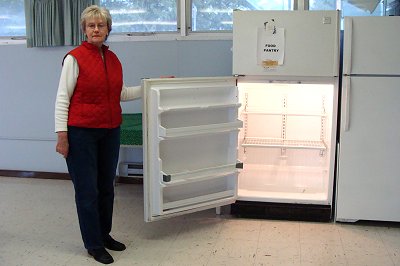- By Dan Veaner
- Around Town
 Print
Print  Lansing Food Pantry Needs More Help for Local Families
Lansing Food Pantry Needs More Help for Local FamiliesAt the Lansing Board of Education meeting David Dubin eloquently said that this is a time to push a little harder and do more with less. He argued that fewer people can afford to pay more taxes in the disastrous economy. "Talk to the people who run the food pantry in Lansing," he said. "They're strained to the limit. They're dying. The lines are incredible. Look at the food pantry at the Methodist Church. They're stripped bare. We're hurting."
A visit to the Lansing United Methodist Church confirms that food pantry shelves are alarmingly bare. That's where Lansing Food Pantry Director Nancy Myers leads a group of stalwart volunteers in an effort to feed local people in need. There aren't fairy-tale people you read about -- they are our neighbors who live in the Lansing community, which is far from immune from the devastating economic downturn. Myers says times are obviously tough and food pantries, including her own, are serving more families than ever before.
"I firmly believe this is going to continue," she says. "I don't see it getting any better for the foreseeable future."
Myers says that the Lansing Food Pantry is currently serving about 87 families, representing at least 20 more families than before the economic downturn. The pantry is offered once a month on a Monday from 3pm to 5pm. In between there is usually food in the storage room to covers families who need food in emergencies, but lately that cupboard has been bare.

Food Pantry Director Nancy Myers and refigerator that
usually holds perishable food for Lansing residents in need
Last years Myers was approached by representatives of Cargill Deicing Technology who wanted to make a $100,000 donation to the Lansing pantry. She asked them to make the donation instead to the Tompkins County Food Distribution Network, which serves 16 local food pantries around the county including Lansing. Local pantries get support from Federal, State and Local Governments, businesses including Tops, Wegman's, Sure Save, Cornell, and the Farmer's Market, and from individuals. (Click here for that story.)
County-wide the Food Distribution Network pantries are also clients of the Food Bank of the Southern Tier, which serves 101,055 people across the county, and sell the food to the pantries at a significantly reduced rate.. They have distributed 1,071,463 pounds of food in Tompkins County valued at $1,596,480 to 35,119 households, including 63,284 children, 109,221 adults, and 173,767 seniors. More than 13,000 Tompkins County residents live below the poverty level. 33% of them are children.
"We continually get new families," she says. "What disturbs me is that we're getting more children. This past month we had 13 more children than we had before. That is scary to me, but it is a sign of the times. We have food, or we will have food."
With more families to serve even a donation as generous as Cargill contributed is stretched thin. The Lansing Food Pantry's March bill for food purchased from the Food Bank of the Southern Tier was $1,100. Items that the food bank doesn't offer are purchased at Aldi's. Those items include items like toilet paper, face soap, laundry detergents and cost another $50 to $200. So Myers is looking for donations to cover about $1,300 per month. She says food donations, large and small help.
Larger and/or regular donations also go a long way toward feeding local families. Twice a month volunteers pick up bread donated by Tops Market.
"Certainly that's a big help because bread certainly is a staple," Myers says. "And we have generous farmers like Jason Turek. We purchase apples and some are donated from Baker's Acres. Baker's Acres also gets us potatoes through Cornell. And there are farmers in the summer who might say they have an abundance of squash. It might only be twenty, but they are used nevertheless and they are gone."
Myers says that the pantry needs donations of more paper items including toilet paper, tissues, paper towels. It also includes soaps for laundry and dishes, because those items can't be purchased with food stamps.
"Those are all extras, and they cost us more money," she says. "There never seems to be anything that's inexpensive in that category."

Shelves that usually hold food are almost stripped bare
because of increased need in the flailing economy
The Lansing Food Pantry feeds hungry minds as well as stomachs. The Family Reading Partnership Program's Bright Red Bookshelf distributes books for kids in need. Local volunteer Judy Hinderliter repairs and cleans donated books before they are put out for kids to take.
"It's unbelievable the number of books that went out of here," Myers says. "It's pretty cute -- you'll see the kid come back the next month and say 'I read that book, it was so good.' She can read a kid and see what book they might want to read or should read, and hears back from them. She's really good at that."
Now that Summer is coming more stress is put on the food pantry to provide food for kids while school is out of session.
"During the school year some kids get free meals at school -- breakfast and/or lunch," says Myers. "But during the summer when they're home I try to give them more food if I can because they are home. Whatever day it is they still need food, and it is tough."
Then in August the food pantry asks for donations for school supplies which are purchased at Target where they are less expensive. The Lansing Schools provide the list of specific supplies that are needed, and Myers says that it is easier to use cash donations to purchase what is needed than to get donations of supplies that may not fit the need.
"It is neat when they come to pick out their supplies in August knowing that on the first day of school they will go with the same list as the other students," she says. "The teachers want you to have them. They need to have those things. How horrible to start school and you're already behind because you don't have the supplies you need. That's a big thing for us."
Donations are especially effective now through the end of April because of a matching funds grant from the Feinstein Foundation . Food pantry directors around the country count food donations and dollars during this period, and are awarded up to $250 in matching funds. The foundation was founded by Alan Shawn Feinstein, who divides $1 million per year among anti-hunger agencies across the United States. The foundation's past 12 annual $1 million challenges have raised $1 billion for over 2000 agencies nationwide. Only donations pledged from March 1 through April 30 are eligible to be matched.
Myers says that donations of food, money, and time are always needed and always appreciated.
"I have the best volunteers in the world," Myers says. "That Monday morning there are 25 people here to set up. I even have a lady from Groton who just wants to help. I my egg lady and my bread lady. It's great when I leave -- it's all clean as if it never happened."
Reporting by Karen Veaner
----
v6i13



